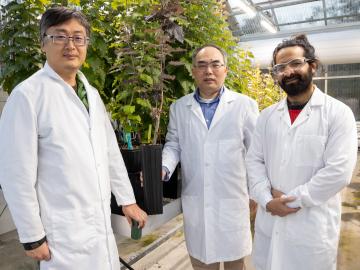Filter News
Area of Research
News Topics
- (-) Clean Water (1)
- (-) Net Zero (3)
- 3-D Printing/Advanced Manufacturing (49)
- Advanced Reactors (12)
- Artificial Intelligence (30)
- Big Data (11)
- Bioenergy (24)
- Biology (23)
- Biomedical (18)
- Biotechnology (7)
- Buildings (15)
- Chemical Sciences (33)
- Climate Change (24)
- Composites (10)
- Computer Science (61)
- Coronavirus (17)
- Critical Materials (11)
- Cybersecurity (18)
- Decarbonization (20)
- Education (3)
- Element Discovery (1)
- Energy Storage (44)
- Environment (44)
- Exascale Computing (12)
- Fossil Energy (1)
- Frontier (16)
- Fusion (14)
- Grid (17)
- High-Performance Computing (31)
- Irradiation (1)
- Isotopes (19)
- ITER (2)
- Machine Learning (14)
- Materials (68)
- Materials Science (54)
- Mercury (2)
- Microscopy (18)
- Molten Salt (2)
- Nanotechnology (28)
- National Security (19)
- Neutron Science (56)
- Nuclear Energy (32)
- Partnerships (27)
- Physics (24)
- Polymers (13)
- Quantum Computing (10)
- Quantum Science (28)
- Renewable Energy (1)
- Security (11)
- Simulation (11)
- Software (1)
- Space Exploration (3)
- Statistics (2)
- Summit (21)
- Sustainable Energy (35)
- Transformational Challenge Reactor (4)
- Transportation (29)
Media Contacts
The United States could triple its current bioeconomy by producing more than 1 billion tons per year of plant-based biomass for renewable fuels, while meeting projected demands for food, feed, fiber, conventional forest products and exports, according to the DOE’s latest Billion-Ton Report led by ORNL.

In a discovery aimed at accelerating the development of process-advantaged crops for jet biofuels, scientists at ORNL developed a capability to insert multiple genes into plants in a single step.

An innovative and sustainable chemistry developed at ORNL for capturing carbon dioxide has been licensed to Holocene, a Knoxville-based startup focused on designing and building plants that remove carbon dioxide

The National Alliance for Water Innovation, a partnership of the Department of Energy’s Oak Ridge National Laboratory, other national labs, university and private sector partners, has been awarded a five-year, $100 million Energy-Water Desalination Hub by DOE to address water security issues in the United States.




